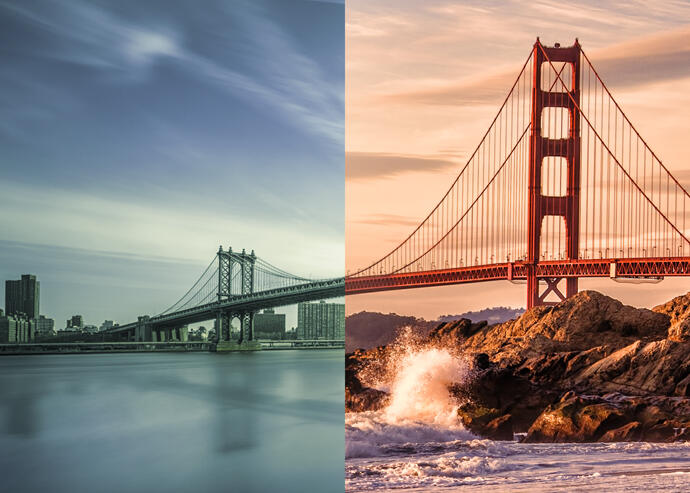
(Getty)
Call it a comeback — for New York City, at least.
This month, the Big Apple overtook reigning champ San Francisco as the most expensive city for rentals, a report by apartment listing site Zumper found.
A New York one-bedroom averaged $2,810 in August; similar digs in the Bay Area ran for $2,800. It’s a minor upset — sure — but one that showcases a major shift.
“This was unthinkable even two years ago,” said Jeff Andrews, the report’s author.
San Francisco had retained the nation’s highest rents since Zumper began collecting data in 2014. As the city drew tech firms, then workers with the wages to spend on swanky living spaces throughout the aughts and 2010s, rents rose to meet demand.
At the beginning of 2019, San Francisco’s median rent for a one-bedroom ran $800 above New York’s.
Then the pandemic saw that decades-long rush reverse course. Rents fell, too. A one-two punch that hit New York nearly as hard as it did the Bay Area.
This year has seen those rental trajectories diverge. Vaccine rollouts pulled college students, families and young professionals hoping to snag a slice of so-called hot vax summer back to New York City. Rents rose with demand and peaked within $40 of their March 2020 average in August, Zumper found.
In San Francisco, Andrews said, the density of tech jobs with work-from-home setups still firmly in place has kept renters away and apartment prices accordingly low.
At $2,800 a month, a one-bedroom is still down 20 percent from its pre-pandemic average — $3,500.
That’s not to say San Francisco is dead. A report last week by listing site RENTCafé found the city’s rental market to be the second-most active in the nation. But the people driving that demand are younger and have less money to spend.
An influx of Gen Z tenants has descended upon rentals with depressed prices. The surge has yet to significantly drive up rents.
Andrews sees San Francisco staying relatively affordable for the foreseeable future, as the spread of the Delta variant continues to delay office reopenings originally slated for fall.
“For tech companies in San Francisco that do plan on having an office, those workers can continue to live outside of the city,” said Andrews. “Which will likely put a ceiling on how much rent will rise.”
New York rents are still showing gains. A StreetEasy report released Friday indicated that July rents in Flatiron, the East Village, the Financial District and Nolita in Manhattan — as well as Downtown Brooklyn, Bed-Stuy and Greenpoint — each surpassed their March averages.
The uptick is likely to continue, StreetEasy economist Nancy Wu said in the report, though at a slower clip.
Miller Samuel CEO Jonathan Miller sees that slow down as a side effect of Delta’s rise.
“I think Covid has had an impact but it’s more of a slowing or easing of some of the intensity,” he said. “The market is still continuing to tighten.”
He attributes part of the rise to federal stimulus dollars flowing to cities, creating jobs, and the reopening of colleges in the fall. He also noted that Bay Area rental prices, too, are rising again.
Rents in San Francisco gained over 2 percentage points from July to August, per Zumper data, rising from $2,720 in July to $2,800 in August.
Meaning, New York’s title as the priciest city could be short-lived.



